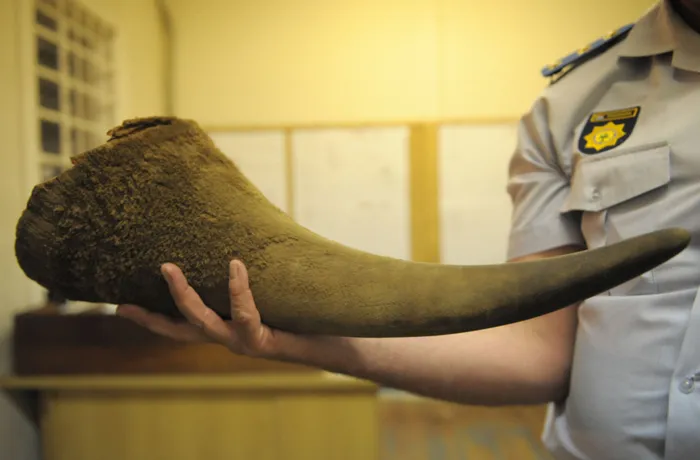SA’s rhino horn ban lifted

11/12/2010, Police officer holding a Rhino Horn; confiscated from four men. Heidleburg Police Station, Picture. Mujahid Safodien 11/12/2010, Police officer holding a Rhino Horn; confiscated from four men. Heidleburg Police Station, Picture. Mujahid Safodien
South Africa’s seven-year ban on selling rhino horn has been lifted in the aftermath of a court case by the world’s biggest private rhino breeder.
The decision means that rhino horn can now be bought and sold again within South Africa, subject to permits, even though it remains illegal for them to be traded internationally in terms of the Convention on International Trade in Endangered Species (Cites).
Mpumalanga rhino breeder John Hume, who owns more than 1 100 rhino and has an estimated stockpile of 4 tons of horn, managed to overturn the ban last November following a case in the Pretoria High Court - but the moratorium remained in force pending a legal appeal by the Department of Environmental Affairs.
However, the Supreme Court of Appeal has now refused leave to appeal against the high court decision, thereby allowing horns to be sold legally again for the first time since February 2009.
While Hume and other private rhino owners argue that the moratorium fuelled the dramatic increase in rhino poaching since 2008, several conservation groups fear the latest court decision could fan a further round of stockpiling and promote the illegal smuggling of local rhino horn to China and other Eastern countries for traditional oriental medicine.
Hume confirmed yesterday that he planned to apply for permits to sell a limited number of horns, but the Department of Environment Affairs has yet to respond on whether it plans to consider further legal action or initiate a fresh moratorium process.
“We would certainly like to resume domestic trading, but as you know we can only sell rhino horn with a permit. We will now apply for a couple of permits and see what conditions the government wishes to apply,” Hume said.
Roger Porter, former head of conservation planning for Ezemvelo KZN Wildlife, said he was concerned that the government still did not have the necessary checks and balances in place to prevent horn being smuggled out of the country illegally.
Fuel trade
“There is a risk that this will fuel the illegal trade. The likelihood is that some people will find ways and means of making money out of this because I cannot fathom how a domestic market would function. How would people obtain value from buying horns when there is no substantial domestic value? I would not accuse John Hume of anything - but what is there to stop these horns being moved subsequently into the illegal international trade?”
His comments were echoed in a recent statement by Dr Colman O’Criodain, a wildlife trade policy analyst for the conservation group WWF.
“It is hard to see any positive conservation benefits from lifting the moratorium on domestic trade in rhino horn at a time when rhino poaching figures are at record highs.
“There is no domestic demand for rhino horn in South Africa, so it is inconceivable that anyone would buy it - unless they intend to sell it abroad illegally or they are speculating that international trade will be legalised. Reopening South Africa’s national rhino horn trade will make it even harder for already overstretched law enforcement agents,” he said.
O’Criodain suggested it also it went against Cites, which had urged nations to implement comprehensive legislation and enforcement controls, including internal trade restrictions.
Last year, a full bench of the Supreme Court ruled that the moratorium should be set aside on procedural grounds, because former Environment Minister Marthinus van Schalkwyk had failed to follow an adequate public consultation process required by law.
In his ruling, Judge Francis Legodi said it appeared to him that the moratorium had contributed to some extent to the upsurge in rhino horn poaching and he could think of no “disastrous implications” in lifting the moratorium.
Late last week, Judges Eric Leach and Nambitha Dambuza of the Supreme Court of Appeal dismissed a government appeal against the high court decision.
The two judges do not appear to have issued detailed reasons for their decision beyond stating that: “The application is dismissed with costs on the grounds that the requirements for special leave to appeal are not satisfied.”
tony.carnie@inl.co.za